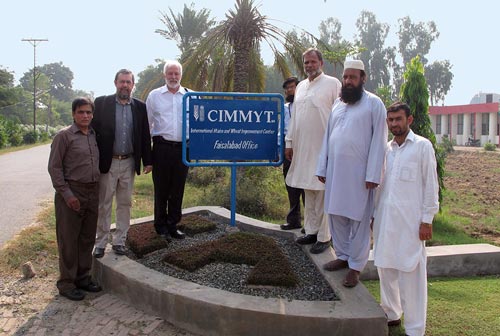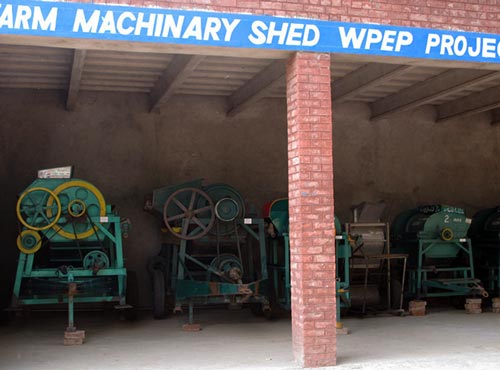
Dr. Etienne Duveiller, South Asia Regional Director, CIMMYT; Dr. Thomas Lumpkin, Director General,
CIMMYT; Dr. Javed Ahmad, Wheat Botanist, Wheat Research Institute WRI Faisalabad; Dr. Makhdoom
Hussain, Director, Wheat Research Institute WRI Faisalabad; Mr. Abdul Hamid, CIMMYT Faisalabad; Mr.
Muhammad Noor, CIMMYT Faisalabad. Photo by Miriam Shindler.
By Imtiaz Muhammad/CIMMYT
CIMMYT has a long history with Pakistan. The majority of wheat grown in the country is a result of their collaboration. Dr. Norman Borlaug’s principles of free germplasm exchange still support Pakistan’s national program.
In 1961, Manzoor A. Bajwa, a young Pakistani wheat scientist, arrived in Mexico to receive training in improved wheat production. While working alongside Borlaug and his team in Ciudad Obregón, Bajwa identified a medium-to-hard white grain line with a high-gluten content ideal for making good chapattis. The new variety also showed promising resistance to rust and powdery mildew. To mark this momentous collaboration, the line was named MexiPak –meaning line selection in Mexico by a Pakistani researcher.
In Pakistan, the name MexiPak is synonymous with the successes of the Green Revolution. In a recent meeting between CIMMYT and Sikandar Hayat Khan Bosan, the Minister for Food Security and Research, he recalled experiences in rural Punjab when he was 7 or 8 years old. One year, his father had record wheat harvests. The reason? “MexiPak,” he said. This is just one example of CIMMYT-Pakistani collaboration. The Pak-81 line, which has been released in more countries than any other wheat variety in history, was selected by a Pakistani breeder while training at CIMMYT.
Today, Pakistan faces daunting challenges due to climate change, changing diets, increasing population, groundwater depletion and growing food security concerns. The new Prime Minister and cabinet have indicated an increased interest in developing Pakistan’s agriculture sector and the country’s agricultural research abilities. In a related development, the University of Agriculture, Faisalabad, recently became the top-ranked university for agricultural sciences in South Asia (NTU Rankings, 2013). CIMMYT and the Pakistan Agricultural Research Council (PARC) are reigniting agricultural research for development across Pakistan.

Since 2010, PARC and CIMMYT have worked closely to improve agronomic practices through projects such as the Wheat Productivity Enhancement Program (W-PEP) and the new Agricultural Innovation Program for Pakistan (AIP), a $30 million program funded by the United States Agency for International Development. The PARC complex in Islamabad houses CIMMYT offices where agronomists, breeders and socio-economic experts work to improve maize and wheat yields.
In a recent visit to Pakistan by CIMMYT Director General Thomas Lumpkin, PARC and the Pakistani government reaffirmed their commitment to establishing the Borlaug Institute for South Asia (BISA) in Pakistan. PARC donated land on its Islamabad campus to erect the BISA-CIMMYT headquarters in Pakistan, as well as land that will be converted into an experimental farm. The Pakistani government also asked BISA to build an experimental farm in every province. BISA will provide Pakistani researchers with the opportunity to collaborate with South Asian counterparts to increase wheat yields and develop more nutritious and heat-resistant maize. BISA is following in the steps of Borlaug in starting a second productive and sustainable Green Revolution.
 Climate adaptation and mitigation
Climate adaptation and mitigation 
